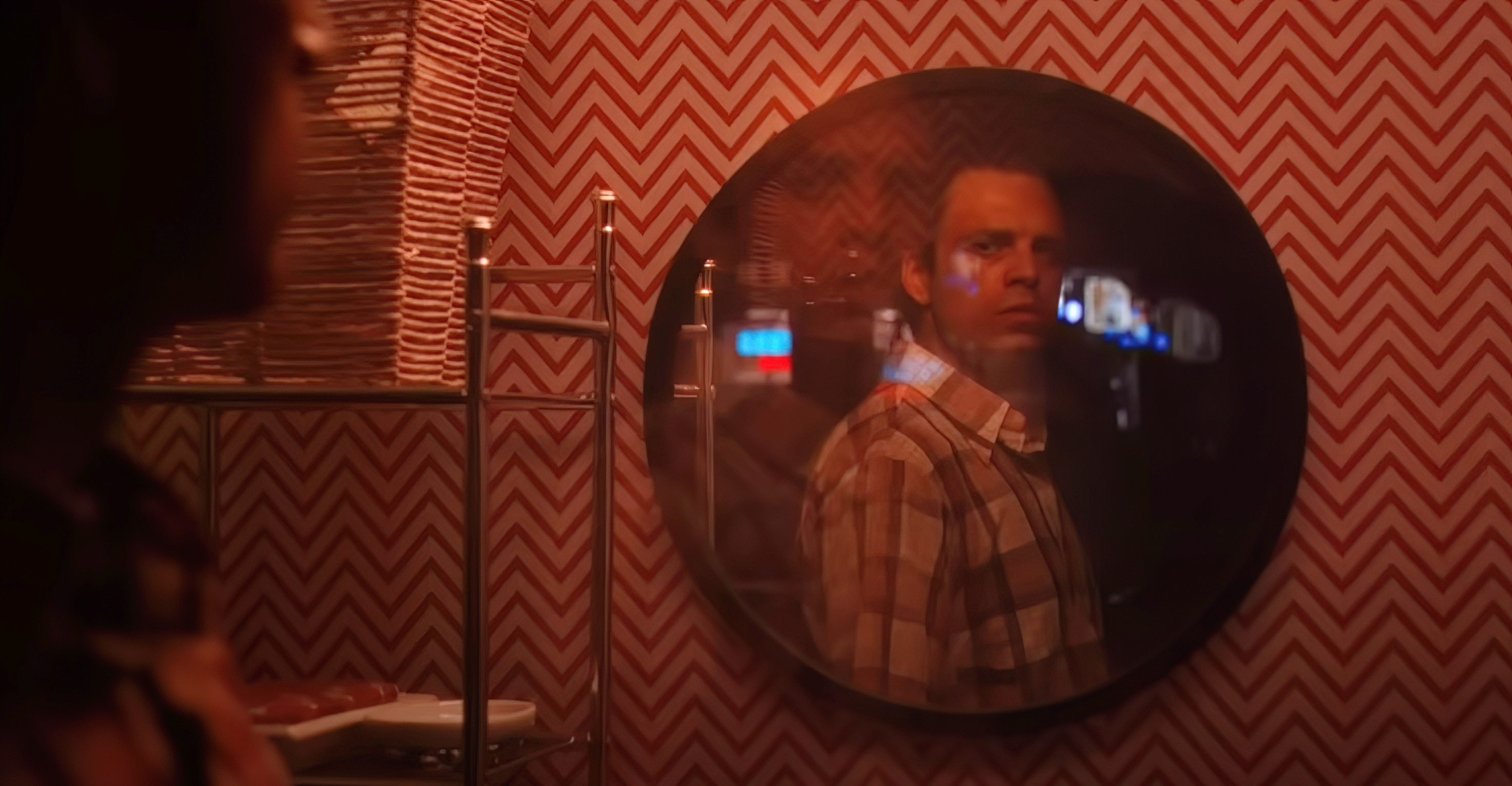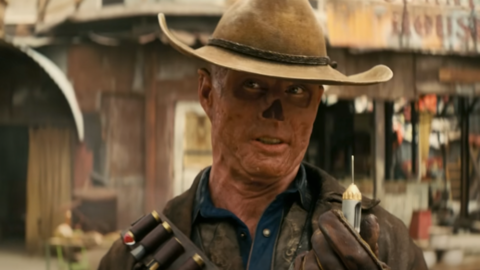
Self-improvement is a common theme in fiction. Across genres, too — in action, romance, sci-fi, and more, we like to see characters better themselves and come into their own. Many of 2024’s most memorable movies held an even closer lens to this idea than usual, with a focus on how passivity can prevent people from living the lives they desire. These movies’ inciting moments of action come not from dramatic external conflicts, but from interior decisions, as their protagonists resolve to become (or not become) someone they actually want to be. This throughline evokes an urgency for viewers to take action in their own lives, to create the world they want to live in.
Perhaps the clearest example of this phenomenon is Jane Schoenbrun’s masterful I Saw the TV Glow. In the movie, teenager Owen (Justice Smith) and his friend Maddy (Brigette Lundy-Paine) become obsessed with a dark fantasy television show in the spirit of Buffy the Vampire Slayer. This obsession causes them both to question their identities and the nature of their reality. Maddy becomes convinced they are the characters from the show, trapped in an unhappy fake reality by the show’s villain, Mr. Melancholy. Owen rejects this interpretation and returns to his depressing reality, literally withering away over the years as he sinks into the rhythms of his unhappy life.

Interpretations vary on the ending — I see it as hopeful — but regardless of your read on it, TV Glow is one of a number of 2024’s trans-authored movies that speak powerfully to themes about self-discovery. It’s particularly effective because of the way its broad themes could apply to anyone. Schoenbrun couples the disappointment of living in an inauthentic way and the incapacitating fear of not knowing what you’ll find if you look deep enough within yourself. That’s something many people can relate to, no matter what relationship they have with gender.
2024’s cisgender cinema engaged with the same subject in a variety of ways. Perhaps the closest to TV Glow is Aaron Schimberg’s fantastic A Different Man, another movie about self-conception and the fear of being seen as different. The movie follows Edward (Sebastian Stan), a struggling actor with a facial disfigurement, who befriends his neighbor Ingrid (Renate Reinsve), a playwright.
In an effort to fix his stagnant professional and personal life, Edward undergoes an experimental treatment that shockingly changes his face to something more acceptable to dominant culture. Afterward, he likewise changes his career into a more “acceptable” one, thriving as a New York real estate agent. But when he learns that Ingrid has written a play about his life, he becomes obsessed with playing the lead part, even though he no longer has the condition the play is about.

Then a third player enters the stage: Oswald (Under the Skin’s Adam Pearson), who has the same condition Edward once had. A charismatic force of nature, Oswald instantly draws the attention of everyone around him, eventually winning the lead part in Ingrid’s play (as well as her affection) away from Edward. The truth A Different Man reveals is that Edward’s condition didn’t primarily hold him back personally and professionally — his personality did.
The movie does not pretend discrimination against people with facial disfigurements doesn’t exist — Oswald faces it too — but there’s a difference in how the two men carry themselves, and thus how the world around them shifts. Oswald is full of energy and a genuineness that draws people to him. His charisma is magnetic, while Edward’s wallowing actively drives people away.
Edward does not really change at all in A Different Man. Instead, he gets the surface-level appearance of change, while Oswald’s presence drives home the truth that Edward’s passivity is killing him from the inside out. Edward’s failure to look critically within himself is instructive in the same way as Owen’s eventual decision to do so in TV Glow, no matter the cost.
Genre fare got in on the action as well in 2024, with Richard Linklater’s murder-for-hire romantic comedy Hit Man, about a psychology and philosophy professor who literally tries on different versions of himself until one sticks. Gary Johnson (Glen Powell) is a quiet teacher who falls into a side gig posing as an assassin-for-hire for a police sting operation. Gary dives into the job, creating a different character for each assignment, with elaborate costumes, histories, and styles of speech for each persona, explicitly allowing him to try on different versions of himself.
By the chaotic end of the movie, the Gary at the start is a distant memory of the Gary he becomes through experimentation. That’s in part because of the thrill of play, but also because Gary stops being a passenger in his life, and finally does the hard work of self-exploration to figure out who he wants to be, then becomes him.
Hit Man wasn’t the only genre picture to explore this dynamic. Jaume Collet-Serra fans like myself were excited to see the Spanish director of The Shallows, The Commuter, and Non-Stop return to his specialty area — mid-budget, transportation-themed thrillers — after being exiled to Hollywood making Dwayne Johnson mega blockbusters. We were not disappointed with the TSA thriller Carry-On.
The movie follows Ethan Kopek (Taron Egerton), a listless TSA agent with a baby on the way, but no real prospects for his career. With new responsibilities around the corner, he’s determined to become a more engaged employee and person. Unfortunately, the day he makes that decision is also the day a terrorist (Jason Bateman) targets him in a blackmail scheme to get a mysterious package through security.

“Law-enforcement-adjacent protagonist gets the courage to be the best version of himself” is nothing particularly new as a thriller beat, but the degree to which Carry-On focuses on Ethan’s passivity in his life makes this an easy fit for the bigger theme. As his girlfriend, Nora (Sofia Carson), makes clear, Ethan has become a shell of himself since being rejected by the police academy. He seems to have no motivation in his professional or personal life, despite being a former star athlete who has the intelligence and charisma to (eventually) outfox a master terrorist. When confronted with the terrorist’s scheme, the easiest path would be to continue to be passive — as Bateman’s character continually reminds him. If he does nothing, he is told, everything will be fine.
Instead, this dilemma finally pushes him into action. He risks it all to become the best version of himself — someone actually engaged with his life and the people around him, who can use his skills to protect and support his loved ones. Coupled with Collet-Serra’s focus on technology and surveillance (his movies are quietly the most evocative depictions of the modern surveillance state in cinema), it makes for a tense character study hidden within a crowd-pleasing thriller.
The underseen German action thriller Sixty Minutes has its own unique vantage point on this theme. The movie has a neat, easy-to-understand gimmick: Professional MMA fighter Octavio Bergmann (Emilio Sakraya) has 60 minutes to get to his daughter’s birthday party, or his ex-wife will file for sole custody. The movie avoids being another tired “cruel ex-wife” story by laying out Octavio’s status as an absent father who has repeatedly prioritized his fighting career over his relationship with his daughter.

“Become the best version of yourself” is a common enough theme in movies about professionals in any physical field. But Sixty Minutes gives the idea a fresh angle by following a man trying to be the best father, instead of the best fighter. All of the movie’s action is motivated by Octavio’s desire to become a new version of himself — a version that makes time for his daughter and is a part of her life. He is willing to abandon his professional goals for this pursuit, literally running away from a fight as he’s about to enter the ring, and the movie presents this as a noble decision. As a highly skilled and active fighter, Octavio comes across as anything but passive, but Sixty Minutes correctly understands that his activity in one area of his life is just masking his passivity in another.
Many other 2024 movies touch on protagonists digging out of passivity or complacency to become whoever they most want to be: Babygirl, Juror #2, Thelma, Love Lies Bleeding, and more. But I Saw the TV Glow, A Different Man, Hit Man, Carry-On, and Sixty Minutes hit the idea hardest for me. If you’re looking for some motivation to become the best version of yourself, it’d make one hell of a quintuple feature.
I Saw the TV Glow is streaming on Max. A Different Man will be streaming on Max starting Jan. 17. Hit Man, Carry-On, and Sixty Minutes are all streaming on Netflix.
Source:https://www.polygon.com/what-to-watch/505657/2024-best-movies-trend-passivity-self-actualization-tv-glow-different-man














